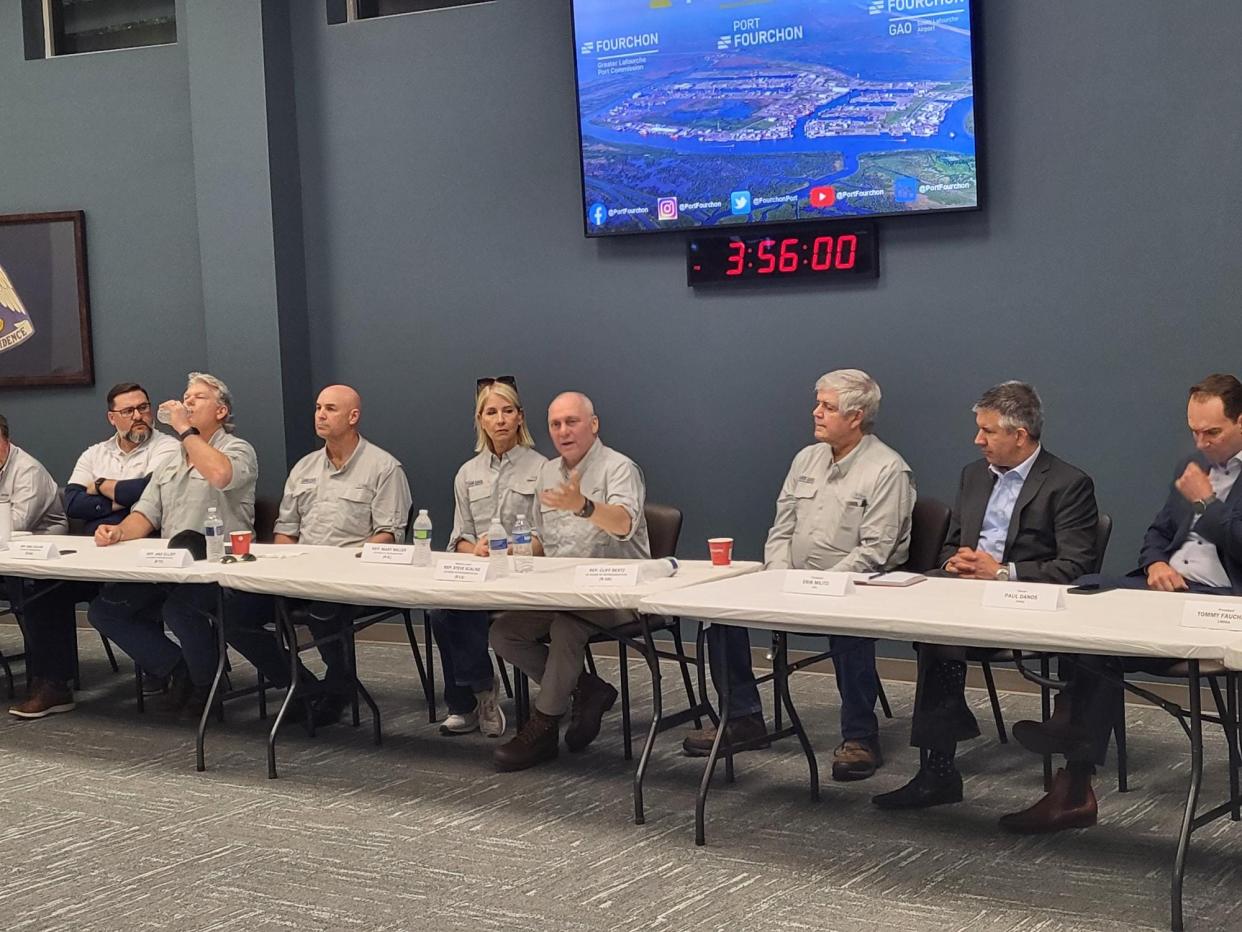'If we go, America loses,' locals tell federal lawmakers during Lafourche roundtable
Bayou business leaders vented frustration to members of Congress who visited Port Fourchon that their communities are dying because of Washington, D.C.
House Majority Leader Steve Scalise brought lawmakers to tour oil rigs and meet with locals in his yearly roundtable at Port Fourchon. Forty-two federal and parish officials, oil executives, business leaders and port commissioners met to discuss political strategy and policy Monday at the Greater Lafourche Port Commission. Having the lawmakers' ears, locals told them their communities are dying because of decisions made by far off bureaucrats.
"How would they not see how vital our port is to the whole country?," Port Commissioner Reggie Ledet said. "How do people not wrap their brain around that? Do they still think it's like Jed Clampett days? They still gettin' it from elsewhere where they can't produce it any cleaner than we can."

Approximately 95% of the 25 million tons of cargo through the port is related to energy production.
Scalise responded that there were members of Congress who saw a zero-sum game when it came to the oil sector. Regulations are being abused to sidestep what he saw as Congress' authority, he said.
"A lot of times, what we've been seeing these last few years, is rules and regulations come out just to stop you from being able to do your job just because somebody's got a different agenda," Scalise said.
While lawsuits against these regulations may win, the work is still delayed. Those delays cost money and so the work is outsourced, Scalise said. This means jobs and the profits go to other countries with worse carbon footprints. The current administration is delaying oil and gas lease sales while claiming record production, he said, and it is disingenuous.
"'Oh, we've never had more production in America,' 'Production is the highest level it's ever been,' as if they had anything to do with it," Scalise said. "And that's where it gets to what you are producing today has nothing to do with the policy the administration had yesterday. It's the policy of the administration five years ago or ten years ago."
It takes about a decade before a lease sale begins to produce oil.
"The ones that know it are just being disingenuous, because they don't want to produce, and they want to use that as an excuse because, God help us, five years from now or 10 years from now, whoever's going to be president… that president is going to see a drop in production, even if we fix the policy tomorrow."
Lafourche Parish President Archie Chaisson told lawmakers that the communities have developed around the Gulf's bounty, either directly part of the industries like the oil sector and fishing, or servicing them. Scalise and locals explained to the other legislators that the state dedicated portions of the energy sector's royalties, and that the local communities taxed themselves, to protect and restore the coast. Without these efforts, he said, the parish would be under water.
But as it becomes less and less tenable to live along the coast, South Central Industrial Association President Joni Tuck said, the infrastructure that their community provides will leave with the people. The country, she said, would regret letting the community die, because it would be more difficult to access the Gulf.
"That controls how we feed and fuel the nation and not just ourselves," Tuck said. "We don't have a coast of convenience. We have a working coast."
Greater Lafourche Port Commissioners said people in Washington, D.C., were making heartless and uninformed decisions that were driving the populations from the area. According to the U.S. Census Data, from April 2020 to July 2023, Lafourche Parish lost 2.6% of its population and Terrebonne was worse, losing 5.4% of its population.
Port Commissioner Chuckie Cheramie said regulations on the local industries and from the Federal Emergency Management Agency's Flood Assessment changes are driving locals out of the area. He said South Louisianans are getting attacked from both sides. Regulators are making it harder for businesses to operate, reducing opportunities to work, and are increasing the cost of living.
More: Louisiana entertainment: Changes to sports betting, a road-trip song, and top festivals
More: Houma hip hop artist lands in iTunes' Top 10 for weekend with new song
"Down here, energy is our lifeline," Charamie said. "But we have a community down here where everybody is leaving, because we have bureaucrats in Washington that's not even elected that's dictating to us how to live. All the people that were 30 minutes from Fourchon, it's now an hour. So that's costing a lot of money for these companies down in Fourchon to operate, because now when they want to get something trucked down here, they have to get it from another state."
He said people who left after Hurricane Ida aren't returning because of regulations and insurance. Instead of putting up with the hassle, they just move.
Woodside Energy's Corporate Affairs Principal Jonathon McClellan caused a pause in the meeting and said it's all about business. He said his company was invested in the Gulf, but if they didn't turn a profit, investors would push them elsewhere.
"I just want to say that our investment dollars will flow. Right now everyone is happy investing in the Gulf of Mexico," he said. "But if there's better opportunity elsewhere, our investors are going to push us to send those dollars to Mexico, send those dollars to Africa, send those dollars to another place. So we're all fighting for the same thing. You can call us in D.C., and our money will flow."
This article originally appeared on The Courier: House Majority Leader Steve Scalise brings roundtable to Port Fourchon
